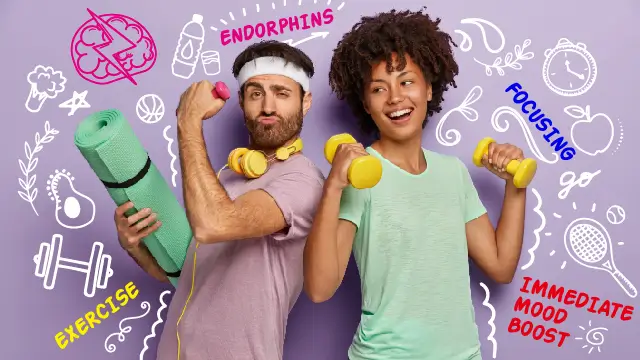Don’t Like to Exercise? Try This Simple, Science-Backed Trick!
Does this sound familiar? You know you should exercise. You want to feel healthier and more energized, but when it’s time to actually do it, the motivation just...vanishes. The couch suddenly looks way more appealing. Trust me—you’re not alone.

While around 7 in 10 U.S. adults set health or fitness goals each New Year, a Gallup report shows 80% abandon them by mid-February. It’s no surprise when the daily grind takes over.
I’ve been there too. For years, exercise felt like a chore—something I had to do, not something I enjoyed.
My own attempts at keeping workout routine often fizzled out after a few weeks or months. But everything changed when I discovered a simple trick: focusing on the immediate mood boost.
With the right mindset and a few practical strategies, you can make fitness consistent, even enjoyable, and a part of your life. Here’s what I’ve learned from behavioral science—and my personal experience to share with you:
Focus on the Immediate Feel-Good Factor
Many approach exercise with long-term goals in mind—weight loss, muscle gain, etc. While these are valid motivators, they require patience. A more effective approach, particularly if you dislike exercise, is to zero in on how it makes you feel in the moment.
As Chad Stecher, a behavioral health economist and an assistant professor at Arizona State University, explains, focusing on the immediate rewards is key for habit formation. "It's about creating a positive feedback loop," Stecher says. "If you associate exercise with feeling good right now, you're more likely to repeat the behavior."
This is backed by science:
- Endorphins: Physical activity triggers the release of endorphins, neurochemicals that act as natural mood elevators. They can induce feelings of euphoria and reduce stress.
- Stress Hormone Reduction: Exercise helps lower cortisol and adrenaline, hormones associated with stress and anxiety.
- Sense of Accomplishment: Even a short workout can provide a sense of achievement, boosting self-esteem.
My own experience reflects this. Instead of dreading a workout, I started paying attention to how energized and positive I felt afterward. This shift in focus made exercise less of a chore and more of a self-care ritual.
Start Small and Build Momentum
Going from zero exercise to intense daily workouts is a recipe for burnout. Peter Duggan, a strength, conditioning and rehabilitation specialist at Fuel Sport & Spine in New York, emphasizes the importance of starting gradually. “People often try to do too much too soon and end up injured or discouraged,” Duggan notes.
The expert advises starting with small, achievable goals. For example, if you're new to exercise, begin with a few short walks each week. From 5 minute to 10, then 15 ... Gradually increase the duration and intensity as you feel more comfortable. This approach helps you build momentum and avoid overwhelming yourself.
Make it Convenient and Accessible
Accessibility plays a significant role in adherence of your workout plan. If your workout requires a lot of time and effort to prepare, you're less likely to do it. Duggan suggests making exercise as convenient as possible. “It has to fit into your lifestyle,” he says. "Even on busy weeks, you can squeeze in a quick workout at home with minimal equipment or a short online class." I found that keeping my workout gear readily accessible—a yoga mat in the living room, running shoes (with my favorite and inspiring color) by the door—served as a positive visual cue and reminder. It eliminated the extra step of having to gather everything, making it easier to just get started.
Track Your Progress (Simply)
While fitness trackers and apps can be useful, they aren't essential, especially when starting. Duggan advises focusing on how you feel rather than getting bogged down by data. A simple yet effective tracking method is "completion signaling." This involves visually marking your progress after each workout. This could be as simple as checking a box on a calendar or moving a physical object. This provides a tangible sense of accomplishment and reinforces the habit.
Make Exercise Part of Your Identity
Ultimately, exercise becomes nonnegotiable when it becomes part of who you are. As Stecher explains, when exercise is tied to your self-identity, you’re more likely to stick with it even when your routine is disrupted. This resonated with me.
Over time, as I consistently prioritized exercise and experienced its positive effects, I began to identify as someone who values fitness. This shift in identity made it easier to maintain my routine, even during challenging times.
By focusing on the immediate mood-boosting benefits, starting small, making it convenient, tracking progress simply, and integrating exercise into your identity, you can make it a sustainable and enjoyable part of your life, even if you don't naturally love it.
I followed this science and kept my workout rutine for almost a year. These science-backed tricks worked for me, and they can help you too. Don't wait—start your exercise journey today and make 2025 your healthiest year yet!


I love sharing funny Apps or games so as to add joy in your life or enhance your productivity. My goal is to provide clear, actionable insights that make understanding Google Play trends easier and empower creators to succeed in a competitive market.
 More Popular Reports
More Popular Reports

 Share
Share


